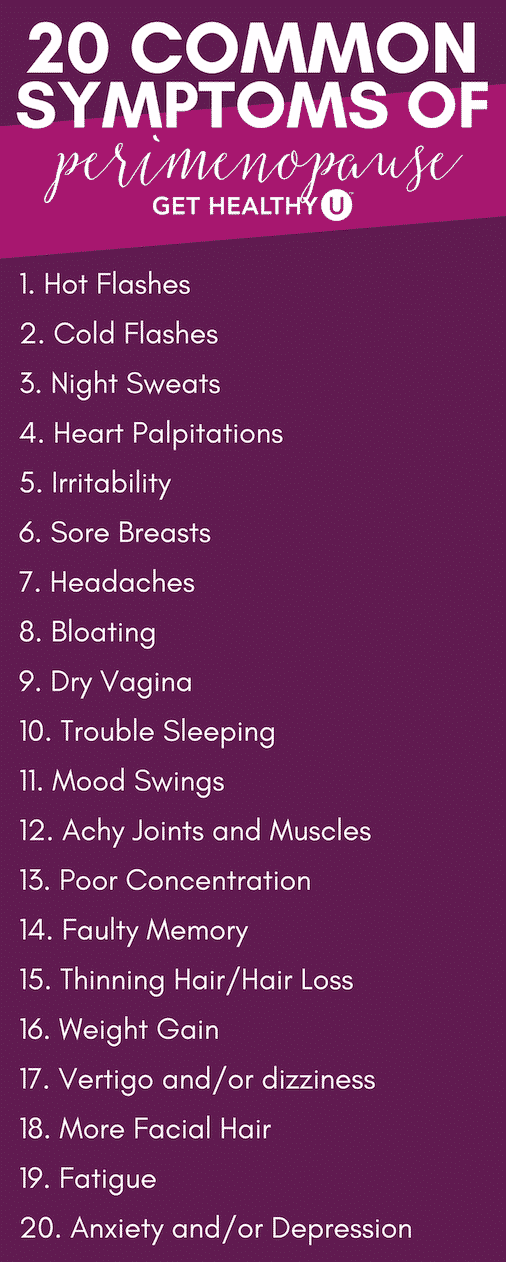This post contains affiliate links. Please see our disclosure policy.
Am I in perimenopause? Isn’t it too soon for that? Well, If you’re in your late 30s or 40s and have recently noticed moodiness, night sweats, irregular periods, and other strange symptoms cropping up, perimenopause might be to blame.
According to the Mayo Clinic, Perimenopause is a process — a gradual transition. “No one test or sign is enough to determine if you’ve entered perimenopause. Your doctor takes many things into consideration, including your age, menstrual history, and what symptoms or body changes you’re experiencing before determining if you are in perimenopause.”
We’re going to break all the perimenopause signs and symptoms down.
What Is Perimenopause?
Perimenopause is the transition time leading up to menopause when your hormones begin to fluctuate to prepare your body for the end of menstruation. Perimenopause is also called menopausal transition or premenopause.
As your estrogen levels rise and fall, symptoms of perimenopause will come and go—which explains why one week you might be dealing with unexpected hot flashes and the next you feel like your old self again.
Whereas menopause is precisely defined as occurring 12 months after your last menstrual period—marking the end of menstruation—perimenopause has a much looser timeframe. It can begin anywhere from your early 30s to your late 40s and can last anywhere from a few years to a decade. (Yeah, those decade-ers deserve a medal.)
Not a lot of people talk about perimenopause. In fact, writing this article, spellcheck has decided that the word perimenopause doesn’t exist.
Well, let me tell you: perimenopause does exist, and if you’re going through it, you’re not alone.
20 Perimenopause Symptoms
Here are 20 of the most common perimenopausal symptoms women experience during this time.
Hot Flashes
Hot flashes are a common symptom of perimenopause. It’s far from the worst side effect, but it can be quite unpleasant and disruptive. A hot flash is a sudden sensation of heat that often causes sweating, heart palpitations, and anxiety.
Cold flashes
Cold flashes are another perimenopause sign. A cold flash is a sudden sensation of cold that can be accompanied by chills and goosebumps.
Night sweats
Night sweats are one of the most common signs of perimenopause. A night sweat is when a person feels hot and sweaty during sleep. Night sweats are typically more intense during the stage of perimenopause but can last throughout perimenopause and menopause..
Heart palpitations
Heart palpitations are another symptom of perimenopause. A heart palpitation is when the heartbeat feels irregular and too intense.
Irritability & Mood Swings
In perimenopause, hormone levels fluctuate and can cause mood swings. Mood swings can happen throughout the premenopausal stages, including sadness, anxiety, irritability and even anger.
Sore breasts
Breast tenderness can occur in the premenopausal stages because of the fluctuation in hormones like estrogen and progesterone and fluid retention.
Headaches
Headaches are a sign of perimenopause as well. A perimenopause headache is when the head feels painful and tight, typically on one side.
Sometimes perimenopause hormone fluctuations cause migraines. Migraines are usually described as a throbbing pain on one side of the head that is often accompanied by nausea or vomiting.
Bloating
Bloating in perimenopause is characterized by an increase in abdominal size and fluid retention. There are foods that can help decrease bloat.
Dry vagina
Vaginal dryness is characterized by reduced hydration or fluid in the tissues of the vagina, which can lead to pain and irritation.
Trouble sleeping
Insomnia, trouble falling asleep, and inability to get restful sleep can occur in perimenopause.
Achy joints and muscles
Women often have aches or pains in perimenopause because of changes in estrogen and progesterone which can lead to increased inflammation of the joints. There is a huge link between menopause and joint pain, and I recommend learning more about it!
Inability to concentrate, memory loss
During perimenopause, memory and concentration problems can happen as estrogen levels drop, leading to a lack of adequate blood flow to the brain.
Faulty memory
Memory loss is one of the most common symptoms of perimenopause. The drop in estrogen levels can lead to less effective blood flow to your brain.
Thinning hair and hair loss
Thinning hair and hair loss are two more common side effects women experience. Thinning hair can happen around the hairline, the crown of the head, or in patches.
Weight gain
Many women experience weight gain as they transition into perimenopause, especially around the belly and thighs.
Fatigue
The hormonal changes of perimenopause can lead to feelings of fatigue.
More facial hair
Increased facial hair around the chin and sideburn area is a hormonally related sign of perimenopause.
Fatigue
Fatigue can occur around perimenopause because of disruptive sleep from night sweats, insomnia, and hot flashes.
Anxiety or depression (more on this below)
Perimenopausal anxiety and depression is also very common. Anxiety and depression are characterized by feelings of fear and anger, difficulty concentrating, changes in sleep patterns.

The Stages of Perimenopause
There are two perimenopausal stages – the early stage and the late stage.
Early-stage perimenopause can begin as early as a woman’s 30s. Signs of early-stage perimenopause include changes in menstrual flow, cycle length, and other period characteristics.
Late-stage perimenopause is likely to occur in the 40s or early 50s. In late-stage perimenopause and before menopause, estrogen hormone levels take a major drop which triggers the classic symptoms of menopause like hot flashes, insomnia, and vaginal dryness.
How Long Does Perimenopause Last
On average, women experience perimenopause for about four years. You know you are no longer in perimenopause if you don’t have a menstrual period for more than 12 months.
Risk Factors for Early Perimenopause
Some evidence suggests that certain factors may make it more likely to start perimenopause and menopause at an earlier age, including:
- Smoking. Women who smoke are more likely to go through menopause at age 50 or younger, a study found.
- Women with a family history of early perimenopause may experience early menopause themselves.
- Chemotherapy or pelvic radiation therapy may result in early perimenopause.
- When a woman has their uterus removed but not their ovaries, they may experience early-onset perimenopause and menopause.. Even though you will no longer have periods and your ovaries are still producing estrogen, the surgery may cause menopause to occur earlier than expected.
Perimenopause Testing
You might be wondering if there’s a test you can take to find out if you’re in perimenopause. The good news is that many more tests are now available to check hormone levels that could indicate perimenopause is occurring.
Perimenopause is a natural process and represents a transition point in life that can last for many years. As such, doctors do not typically diagnose it unless its symptoms like hot flashes or night sweats cause significant discomfort or inconvenience.
If your doctor suspects another condition may be causing your symptoms (like an underactive thyroid) rather than perimenopause, they will likely order hormone testing.
Hormone testing is done through a hormone panel to test estrogen levels and other sex-linked hormones. This kind of testing can often show if you are nearing or in perimenopause.
Today, there are even at-home tests for perimenopause that can measure estradiol (a common form of estrogen in the body), luteinizing hormone (LH), and follicle-stimulating hormone (FSH).
For context, LH and FSH are hormones that are critical for the process of ovulation. During perimenopause, when quantities of eggs in the ovaries decrease, the levels of LH and FSH increase in the body.
The hormone estrogen regulates the function of the reproductive organs and levels normally fall as menopause approaches.
Perimenopause and Fertility
Women are having children at later ages than previous generations. This means that a woman has a higher chance of experiencing perimenopause before or during her childbearing years. What women need to know about perimenopause and fertility is that if they maintain their ovaries, fertility can be maintained.
Many women are able to conceive during perimenopause. For women struggling to conceive during perimenopause, fertility treatments like IUI and IVF are often an option.
Symptoms of ovulation during perimenopause
Sometimes menstruation and ovulation can be confusing during perimenopause because they begin to change. The symptoms of ovulation during perimenopause can be unpredictable.
In perimenopause, anovulatory cycles may occur. When an ovary cannot receive hormonal signals and does not “respond,” a follicle can’t develop, and the woman will no longer have her menstrual cycle. Women in the second phase of perimenopause often experience this.
A perimenopausal woman may then experience anovulatory bleeding, which is the shedding of superficial layers of the uterus. It’s important to note this period is not true as ovulation has not occurred.
These anovulatory periods can vary from short to heavy and long-lasting. The unpredictability of a perimenopausal period is another frustrating symptom for many women.
How To Deal With Perimenopause
While that list might be upsetting, here’s the good news: you’re not alone! All women are a part of this club or will be eventually. That means you not only have others to lean on but many tried and true remedies that others have used to help relieve some of those unpleasant symptoms.
1. Talk About Perimenopause
Every woman goes through perimenopause, and every woman out there has a story to tell as well as ideas to help ease some of the symptoms. So the first tip in dealing with perimenopause? Talk about it!
Talk about it with your girlfriends or co-workers. Tell them about your issues. See what other women are feeling and especially what they’re doing to help their symptoms. Most women are more than happy to share their misery with someone else who understands, and likewise, most of these same people are excited to tell you about things that helped ease their discomfort.
I even put together a huge list of real menopause advice from 60+ women who’ve been there. It helps to hear practical tips!
Perimenopause can even have an impact on your career. There are periods of lost productivity, and women may drop out of the workforce or use fewer hours as a result of symptoms such as hot flashes. On average, excessive health care expenditures related to menopause-related symptoms cost $2,000 per year for women.
2. Exercise Regularly

When you’re bloated and crabby, exercise might be the last thing on your mind. You might want to reconsider, however, since exercise is likely the ticket to feeling better. First and foremost we know that regular exercise helps keep your weight down. This is important since being overweight has been shown to increase hot flashes and night sweats.
Exercise is one way to help combat the effects of perimenopause weight gain. Research shows that weight gain around the premenopausal and menopausal stage is caused by a combination of factors, including decreased metabolic rate, changes in levels of estrogen and progesterone, and increased appetite due to menopause symptoms such as hot flashes or night sweats.
The decreased availability of female sex hormones can lead to a decrease in serotonin production which is related to depression and anxiety. All of these factors certainly make weight management more challenging during perimenopause.
Beyond weight, exercise helps improve your mood, reduce anxiety and raise self-confidence. Regular exercise can also reduce heavy bleeding and cramping. So get out there and move! Want something simple to try at home? Try our 10-Minute Beginner Tabata Workout.
Related: 9 Ways To Get Rid of Menopausal Belly Fat
3. Food + Sex = Sleep
That’s right: you might need to plan out your pre-bedtime routine to sleep better. First and foremost, cut out the sugar and alcohol before bed. Both will not only wake you up in the middle of the night but also increase night sweats. Instead, have a glass of water before bed and if you’re hungry, eat a 150-200 calorie snack of protein/carb mixes like a tablespoon of almond butter on whole-grain toast or a handful of nuts and some fruit. Next, set up a “lovely” place to sleep. Keep your bedroom cool and dark. Use some lavender pillow spray or other aromatherapy to help you unwind. No screens allowed! Turn on a small fan both for the white noise and the cooling.
Finally, say yes to sex! That’s right—you might think you have another perfect excuse in perimenopause to say no to sex, but having intercourse before sleep will actually help you sleep better. Dr. Saralyn Mark from the Yale School of Medicine says it’s all about hormones. Sexual intercourse boosts your production of oxytocin, a feel-good hormone, and estrogen while decreasing the production of the stress hormone known as cortisol. All of this leads to a calmer, more relaxed you!
4. Quit Smoking
Add perimenopause to the long list of reasons you shouldn’t smoke. As mentioned above, smoking is a risk factor for early perimenopause and menopause. A Norwegian study found that women who smoke are 59% more likely to have reached menopause before age 45; for the heaviest smokers, the risk of early menopause is nearly doubled. Yikes! Yet another incentive to seek out some help in order to break the habit.
5. Hormone Therapy
If, despite all attempts to intervene in a natural way, you may feel the need to seek out medical attention and find another way. Don’t suffer in silence! There are a variety of things that a doctor may decide will help. Some forms of birth control pills can regulate your menstrual cycle and relieve certain symptoms.
Other hormone therapy replacements can be prescribed to you in pill form, patch, vaginal ring, gel or spray. There are even over-the-counter natural remedies such as black cohosh that have been reported to help. Just keep in mind that with every medication, there are potential side effects.
You have to decide for yourself if the relief is worth the risks. When push comes to shove, be your own advocate. If you’re having hot flashes, get some cool girl pearls or sleep with the air on.
For mood swings, be gentle to yourself and treat yourself to some daily self-care. Perimenopause anxiety is very challenging, so be kind to yourself.
TIP: As always, if symptoms persist or become overwhelming, see your doctor since there are clinical remedies that can be tried. In the meantime, here are things you can do yourself to be proactive and take control of your health.
Perimenopausal Mental Health

Sometimes perimenopausal mood swings are more serious. Mental health is so important, and it’s key to be vigilant about your mental health in all stages of life, including perimenopause.
What is perimenopausal anxiety?
Perimenopausal anxiety is a common symptom and can make you feel nervous, irritable, or on edge. This feeling typically comes with an underlying fear of something bad happening in the future, such as getting sick or being incapable of taking care of your family. It is caused by fluctuating estrogen levels that cause mood swings.
Estrogen isn’t the only hormone that fluctuates during perimenopause that causes anxiety, however. Progesterone levels also fluctuate and can cause anxiety and irritability.
What is perimenopausal depression?
A feeling of extreme sadness that lasts for more than two weeks could be a sign of perimenopause-related depression. As already mentioned, hormones such as progesterone and estrogen are out of balance during this time, leading to mood changes like sudden feelings of hopelessness, worthlessness or guilt.
What causes perimenopause anxiety and depression?
The exact cause of menopausal depression is unknown, but clinical research has shown that the most common triggers for perimenopausal and postmenopausal depression are a lack of social support, events such as divorce or death in one’s family increased financial stressors, loss of fertility or decreased libido.
It’s important to remember that these symptoms mimic those experienced by women with major depressive disorder, so it’s critical to have an evaluation done if you’re experiencing long-lasting low moods.
Perimenopause Mental Health Support
Perimenopausal depression is also common, and it’s one of the most difficult parts of menopause to live with because there are no visible signs that anything is wrong- yet you’re suffering from mood swings, crying spells, and lack of pleasure in activities you used to love.
Absolutely speak with your doctor. That’s the first thing to do with any mental health or physical health issue. We also recommend working on stress relief, mental wellbeing, and cognitive behavioral therapy.
Perimenopause and Beyond – Some of Your Best Years

Perimenopause is a major life transition, there’s no way around that. There are certain adjustments to be made but remember that not all aspects of these stages are negative – with the wide availability of treatments, you can more comfortably deal with changes during these transitional periods too.
It’s hard to adjust when your body starts making changes after 30, but with the right support and treatment, you can make it through and even enjoy the stage. Many women say their 40s and 50s are some of the best years of their life.



Also acne is a symptom or negative side effect in perimenopause. At least for myself and a few friends 😥.
Thank you for your blog.. I truly thought I was going crazy, and I to, had problems with spell check when typing “perimenopause!” I guess that’s another thing to add to your list.
I will take your advice and pray it works..
Hi Karen – menopause can really be a pain! And believe me, you’re not alone. And we’ve got plenty of articles to help – check out the below.
https://gethealthyu.com/ingredient-making-your-menopause-symptoms-worse/
https://gethealthyu.com/9-proven-ways-happier/
https://gethealthyu.com/10-ways-deal-menopause-symptoms/
https://gethealthyu.com/how-to-prevent-menopausal-weight-gain/
https://gethealthyu.com/lose-menopausal-belly-fat/
Thanks for this post. It has truly provided me with more insights as to the changes my body is experiencing. This was definitely helpful.